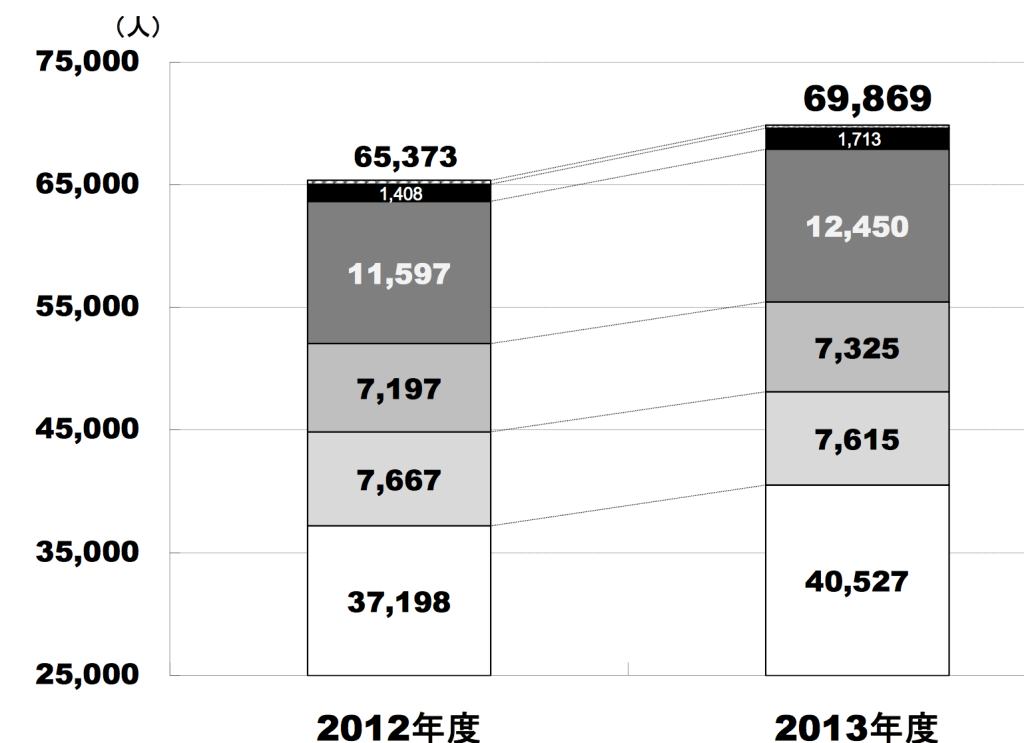
Hello! It’s been two weeks! Always got surprised at the fact that time goes so fast.
Speaking of time, it’s been one and half year since I started studying in the United States. what has been changed in myself? Well, I think there are quite a lot. I have never gone outside California yet. I haven’t been to other countries besides the US and Japan for a travel. For the most of time, I am in Chico, concentrating on my studies. It’s very fun because I can feel that I am absorbing and accumulating so much information from my classes and found them useful for my future.
However, I think I need to see different cities and world more often. Right now, the only way to reach out the world is the Internet. I know that it’s not enough. To fully feel and perceive something new or unfamiliar to me, I must experience and see it with my eyes.
Of course, Chico is a beautiful and wonderful place, but it is not enough for me.

In my past blog posts, I discussed the reasons why I decided to study in the US (This post was written in only Japanese) and the gains from that decisions.
Now that I have talked about these two aspects, it is high time to talk about what could make myself different from other people. Here I compare myself to other Japanese international students at Chico State as well as those who go to study at different universities and colleges in the US and other nations.
It would be interesting to analyze the same thing, but with American students and international students from other countries. However, my next big obstacle in my life is to get a job in Japan. Thus, I would like to do this with only other Japanese students.
Let’s start this discussion with looking at a statistics about the number of Japanese students who have an experience of studying abroad from the Ministry of Education, Culture, Sports, Science, and Technology (MEXT).
According to the date that is provided by the MEXT, there are over 60,000 Japanese students who study overseas in 2012. China is the most famous destination county among other countries with over 21,000 people. About 20,000 of them are in the US, and it marks the 2nd place, followed by the UK, Taiwan, Germany, and etc. This number includes all kinds of studying abroad programs.

With this graph above, what we can know is that there are lots of Japanese students who study abroad for less than one year. The white part is composed of those who have gone overseas for less than one month and accounts for the biggest portion of the each bar. The interesting part that I think I should point out is that the third section from the top of each bar, which has a gray color comprises the second biggest portion of those bars.
What this suggests is that the number of Japanese students who use an exchange program for their studying abroad is increasing and accounts for a quite a bit portion of the overall studying abroad population. Since the Japanese government’s global education policy is to encourage more and more students to go overseas, this information suggests that the policy is working.
To be honest, that might not be something that I am really excited about it because one year of study abroad experience is long enough for international and global Japanese companies who seek for new employees. Unlike me, who is here in the US to acquire a degree and stay here for more then 1 year, those who use an exchange program go to their universities in Japan and know how the Japanese job hunting system works thanks to the plenty of information. For companies, if they could find those Japanese students at a career forum, it would be much better for them to hire them because they could possibly reduce the cost that they would have to spend to hire somebody like me (4-year studying abroad). In addition, now those exchange Japanese students can participate in the global career forum in Boston or LA, which used to be open only for those who study in the US for s longer period of time. In my opinion, it seems that those exchange students tend to be from top ranked Japanese universities. I am not sure about this perspective, but as far as I know, this tendency is true.
In short, as the number of Japanese exchange students go abroad to study increases, the 4-year studying abroad program could possibly become less valuable. This is how I feel like now.
I know this sounds like too pessimistic. Yeah it does because i am a pessimist, but a positive pessimist. So I would like to think about how to differentiate myself from them or rather how I can increase my value.
First of all, I am not a top-ranked US university student. If one said I am a student at UCLA, most of Japanese people would recognize its name. However, I am in Chico. Not many people are most likely to recognize Chico (It’s ok though. I am proud of myself being a Chico State wildcat!). Second, well I think there is no second here.
Anyway, the point is that the value of a top-ranked university itself is really really strong. Because it is a common sense that the better college you can get in, the better you life is going to be.
I think this is one of the most important notions that I need to think about. Obviously if I were a student at one of those top school, I would think what makes me different because going to those school will automatically make you different. Considering that the idea that a better school equals a better life is a common sense, to great extent, it is likely to happen once students graduate from those universities.
However, it is still possible that students from a middle university can attain the same level of life.
According to an online article, “Does It Matter Where You Go to College?” by JORDAN WEISSMANN from the Atlantic,
The big surprise: Selectivity didn’t matter. Academic siblings ended up making just about the same wages after college regardless of how choosy their school was. In fact, where the students applied, and their final class rank in school, were much better correlated with earnings than their school’s admissions standards. If you were smart enough to get into Yale, or even take a shot at it, you were probably smart enough to earn like a Yale grad.
The academic sibling here means students who marked the almost same academic level. Therefore, wherever you apply, it is still possible for you to earn the same amount of wage.
However, the study the author used pointed out that although the admission standard itself does not completely explain about how successful a student is going to be, he or she will not be able to make up for school’s resources that he or she could have acquired by attending one of those top universities. Because those top schools’ tuition fee tend to much more expensive than that of those middle rank schools. They have more various school resources, such as libraries, labs, computers, and of course, people.
These connections with other people are the biggest factor that makes everything different.
It took me really really long to get this conclusion, but yes, this is it. This is why I wrote I wanna get out of Chico sometimes at the beginning of this post. No matter how hard I try to make myself more different and more valuable, there is a certain limitation. I am pretty sure that the more connections I make, the more experiences I will be getting.
Now I know what to do.

So get out my comfort zone and let’s start connecting with more people!!
Thank you for reading.